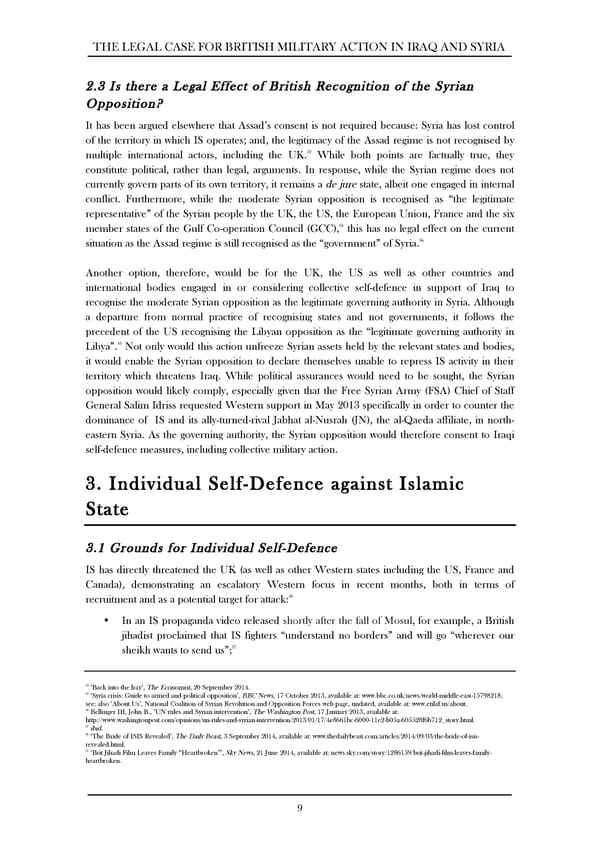THE LEGAL CASE FOR BRITISH MILITARY ACTION IN IRAQ AND SYRIA 2.3 Is there a Legal Effect of British Recognition of the Syrian Opposition? It has been argued elsewhere that Assad’s consent is not required because: Syria has lost control of the territory in which IS operates; and, the legitimacy of the Assad regime is not recognised by 52 multiple international actors, including the UK. While both points are factually true, they constitute political, rather than legal, arguments. In response, while the Syrian regime does not currently govern parts of its own territory, it remains a de jure state, albeit one engaged in internal conflict. Furthermore, while the moderate Syrian opposition is recognised as “the legitimate representative” of the Syrian people by the UK, the US, the European Union, France and the six member states of the Gulf Co-operation Council (GCC),53 this has no legal effect on the current situation as the Assad regime is still recognised as the “government” of Syria.54 Another option, therefore, would be for the UK, the US as well as other countries and international bodies engaged in or considering collective self-defence in support of Iraq to recognise the moderate Syrian opposition as the legitimate governing authority in Syria. Although a departure from normal practice of recognising states and not governments, it follows the precedent of the US recognising the Libyan opposition as the “legitimate governing authority in 55 Libya”. Not only would this action unfreeze Syrian assets held by the relevant states and bodies, it would enable the Syrian opposition to declare themselves unable to repress IS activity in their territory which threatens Iraq. While political assurances would need to be sought, the Syrian opposition would likely comply, especially given that the Free Syrian Army (FSA) Chief of Staff General Salim Idriss requested Western support in May 2013 specifically in order to counter the dominance of IS and its ally-turned-rival Jabhat al-Nusrah (JN), the al-Qaeda affiliate, in north- eastern Syria. As the governing authority, the Syrian opposition would therefore consent to Iraqi self-defence measures, including collective military action. 3. Individual Self-Defence against Islamic State 3.1 Grounds for Individual Self-Defence IS has directly threatened the UK (as well as other Western states including the US, France and Canada), demonstrating an escalatory Western focus in recent months, both in terms of recruitment and as a potential target for attack:56 • In an IS propaganda video released shortly after the fall of Mosul, for example, a British jihadist proclaimed that IS fighters “understand no borders” and will go “wherever our sheikh wants to send us”;57 52 ‘Back into the fray’, The Economist, 20 September 2014. 53 ‘Syria crisis: Guide to armed and political opposition’, BBC News, 17 October 2013, available at: www.bbc.co.uk/news/world-middle-east-15798218; see: also ‘About Us’, National Coalition of Syrian Revolution and Opposition Forces web page, undated, available at: www.etilaf.us/about. 54 Bellinger III, John B., ‘UN rules and Syrian intervention’, The Washington Post, 17 January 2013, available at: http://www.washingtonpost.com/opinions/un-rules-and-syrian-intervention/2013/01/17/4e8661bc-6000-11e2-b05a-605528f6b712_story.html. 55 ibid. 56 ‘The Bride of ISIS Revealed’, The Daily Beast, 3 September 2014, available at: www.thedailybeast.com/articles/2014/09/03/the-bride-of-isis- revealed.html. 57 ‘Brit Jihadi Film Leaves Family “Heartbroken”’, Sky News, 21 June 2014, available at: news.sky.com/story/1286159/brit-jihadi-film-leaves-family- heartbroken. 9
 The legal case for action Page 8 Page 10
The legal case for action Page 8 Page 10